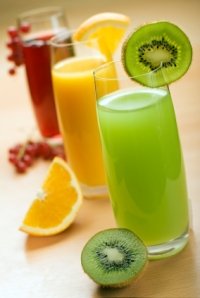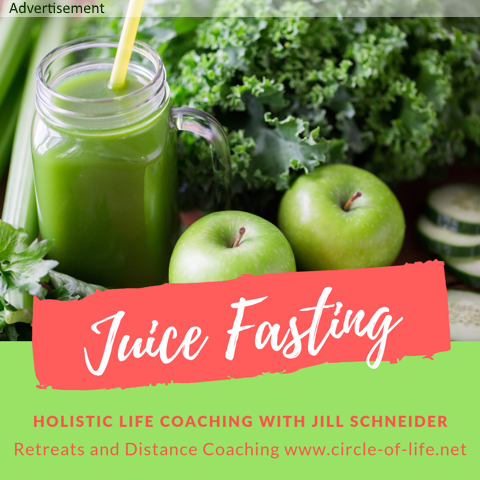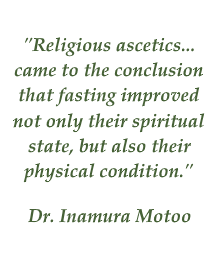Juice Fasting
for Health and Detox
Juice fasting offers a great way to detox and increase health and vitality. The nutritional gusto of fresh organic juices will help your body to heal, rebuild, and detoxify waste products. Even short fasts are beneficial toward leading you to a greater sense of well-being.
Many health professionals feel juice fasting to be THE fast to perform, as it is gentler than water fasting, giving your body high-quality nutrients in readily available form for your body to use toward rebuilding.
These vitamins, minerals, and enzymes can be taken up by the blood easily and without burdening the body's digestive system. Juice fasting also helps you to build a taste for fresh produce and become accustomed to the increased vitality. You will be drawn to more live foods after your fast.
Both fruit and vegetable juices can be used, although they shouldn't be mixed in the same drink. Canned, bottled, and frozen juices should be avoided during a juice fast. We want the freshest, highest-quality, organic produce to go into our bodies during a fast.
Because of the potent nature of live juices, it is recommended you dilute them by at least 1/4 (1 part water to 3 parts juice), some suggest diluting by half. Three to five glasses of this diluted juice is drunk every day, along with plenty of water, at least 2 quarts (which is the same amount as eight 8-ounce glasses). A couple cups of herbal tea is usually also permitted. The Juice Fasting Daily Plan gives a detailed breakdown for when and how much juice to drink.
Fresh, homemade juices should be drunk right away and not stored for any length of time as the nutrients break down quickly.
Don't have a juicer?
Having a juicer affords you the most options and creativity, but it isn't necessary to have one to do a juice fast. Only a small amount of juice is actually consumed during a juice fast, the vast majority of your hydration will come from purified water.
These are some options for use without a juicer:
- Lemons are easy to squeeze by hand. Use the
juice of one lemon in a cup of warm water. A little honey or real maple syrup may be added to make it
more palatable. This is much like the Lemonade Diet/Master Cleanse, which is a highly effective fasting
routine. Lemons are very cleansing and detoxifying and are known to be helpful in breaking up mucus,
which is great for the bowels.
- Small citrus juicers are very affordable, some as little
as $20. With one of these, you could use oranges, grapefruits, tangerines, lemons, and limes for
your juice.
- Depending on the time of year and your particular health food store or farmer's market, you may find
fresh juices available that aren't pasteurized. In the fall, apple cider (soft, no alcohol) may be available.
- You can use green powdered drinks available from health food stores or online.
- Make a vegetable broth to use as your "juice". Broth fasting is an acceptable form of fasting, and while it won't deliver the live enzymes that raw juice does, it will have plenty of vitamins, minerals, and electrolytes. Add lots of leafy greens to the broth for the best nutritional punch. In the winter, this type of fast can be very satisfying and warming. Save the strained out vegetables to eat after your fast.
You have lots of options with a juicer

You can juice any fresh fruit or vegetable if you have a quality juicer, though you shouldn't mix fruits and vegetables in the same drink. And melons are always best consumed by themselves.
That still leaves you a lot of room to be creative with new concoctions if you so desire, but there's nothing wrong with simplicity as well.
Choosing just one fruit or vegetable for your juice is fine and may lessen the amount of time and effort you put into your daily meals, leaving you free for other detoxing practices (baths, saunas, dry skin brushing, light exercise, or breathing exercises) and spiritual pursuits. Fasting should always be accompanied by plenty of time to go inward and be reflective, listening for your inner messages and insights.
Some really good juices for juice fasting are apple, beet, cabbage, carrot, celery, citrus, cucumber, grape, and "green drinks" from leafy greens, including wheat grass. Use this chart to help you decide.
Healing Effects of Fruit Juices | |
|---|---|
| Apples | good for liver and intestines, relieves diarrhea |
| Blackberries | prevent diarrhea, help eliminate phlegm |
| Blueberries | help strengthen immune system, lower fever |
| Cherries | strengthen blood, good for colon and menstrual problems |
| Grapes | purify and strengthen blood, good for colon |
| Lemons | good for liver and gallbladder, helps with allergies, asthma, cardiovascular disease, and colds |
| Oranges | strengthen immune and nervous sytems, good for cardiovascular disease, obesity, and varicose veins |
| Peaches | improve skin health, help detoxify |
| Pears | helps lower blood pressure, good for gallbladder |
| Pineapple | good for eyes and skin, helps with allergies, arthritis, inflammation, and edema |
| Strawberries | cleansing to the blood, strengthen nerves |
| Watermelon | good for kidneys, helps with edema |
Healing Effects of Vegetable Juices | |
|---|---|
| Beets | good for blood and liver, help with arthritis and menstrual problems |
| Cabbage | good for colon, helps with ulcers and colitis |
| Carrot | good for eyes and skin, fights infection, helps with arthritis and osteoporosis |
| Celery | good detoxifier, good for kidneys |
| Cucumber | helpful toward edema and diabetes |
| Dandelion | good detoxifier |
| Leafy Greens | purifier, good for skin, digestive problems, and obesity |
| Onion | helps lower blood pressure, good for colon |
| Potatoes | good for intestines, counteracts excess acidity in stomach |
| Radish | good for liver |
| Spinach | blood builder, good for eczema |
| Tomatoes | good for digestive system |
| Wheatgrass | good for blood, liver, intestines, breath |
Healing Effects of Juiced Herbs | |
|---|---|
| Garlic | lowers blood pressure, fights germs, good for allergies, colds, cardiovascular disease, and diabetes |
| Horseradish | acts as disinfectant and diuretic |
| Parsley | diuretic |
| Watercress | detoxifier, good for anemia and colds |
Tips for Juice Fasting:
- See the Juice Fast Daily Plan for guidelines.
- Drink 3-5 glasses of diluted juice per day. If you have any stomach pain, dilute further or "chew" it before swallowing
to thoroughly mix with saliva. The actual amount of juice will be about half a quart per day.
- Drink a minimum of 2 quarts of water. You can add fresh squeezed lemon to this water, if desired.
- One or two cups of herbal tea is ok. You can use a stimulating one in the morning and a sleep-enhancing one before bed.
- While fresh juices should be drunk promptly, don't drink in a hurry. Take the time to treat it as a "meal", paying attention
to the physical sensations that come from the body's nourishment.
- Eating the juice with a spoon can help you slow down and feel fuller.
For all fasts:
- Preparation - Prepare for a fast by eating fewer and lighter meals for a couple days prior. The length
of preparation is based on the intensity and length of your planned fast. The longer and/or more intense the fast, the
more days of preparation you should make. For a one day fast, you can just eat a light dinner the night before.
- Caffeine - If you're a coffee drinker, wean yourself off and you'll avoid the withdrawal headache. This goes
for other caffeinated beverages, as well.
- Exercise and activity - Plan for a light workload during a fast. Don't overdo. Moderate exercise is ok,
even helpful, but save the more strenuous workouts for another time. Walking and yoga are particularly well-suited
to fasting.
- Detox - Take time to do breathing exercises
for increased health and detox. Engage in dry skin
brushing to enhance the body's ability to detox through both the skin and the lymphatic system.
- Rest - Get plenty of rest--allow yourself naps during the day whenever you feel the need.
- Tips - Read the Water Fasting Tips page
as most of the information there can be helpful during any type of fast or cleansing diet.
- Colon health - Many recommend enemas during any kind of fast, but it isn't necessary. If the bowels don't
move for the duration of your fast, that's ok. The bowels will move when you resume intake of regular foods.
You can add the psyllium cleanse to your routine by adding 1-2 tablespoons of psyllium husks (available in most pharmacies, in the laxative section) to a glass of water. Do this one or two times per day for 2-3 days both before and after your fast, but not during. Or follow the instructions on the Colon Cleanse Recipe page. Psyllium is a natural fiber laxative that is excellent for cleansing the intestines. Organically-grown psyllium from your health food store, is the best to use.
There are other options for fasting colon cleansing, as well. - Breaking the fast - Coming off a fast requires special attention as well. Do so slowly,
easing back into regular foods (but making better choices about which foods!). See the
Guidelines for Breaking a Fast page for information
on the order of re-introduction of foods, quantities, and frequency. You also might want to check out this story about how NOT to break a fast.
- After the fast - Pay attention to the subtle signals from your body as they can guide you to the
foods most appropriate for your needs. Check out the Recipe Section of
this site for ideas.
Related Pages
How long should you fast? Discover
what length of time is best for you and how much preparation is required.Intermittent Fasting offers several unique methods for integrating regular fasting into your life.
Health Conditions Improved by Fasting. See the long list of ailments that are known to respond well to fasting.
Cleansing Diets offers guidance on using a cleansing diet as a partial fast or as a means of preparation for other types of fasting.
The real benefits of Fasting for Weight Loss, affecting deep and lasting changes in our lives.
Recent Posts
-
Valter Longo and the Longevity Diet
Valter Longo's Longevity Diet, which is a fasting mimicking diet, is showing great promise as a prescribed therapy. If you haven't heard of Valter Longo, check out his newly launched website to follow… -
Fasting Overview for Beginners
Information on fasting especially geared toward the beginner. Important guidelines on fasting including the contraindications and how to do a simple one-day fast. -
Meat vs. Vegan | AllAboutFasting
Confusion seems to arise as to whether this site promotes meat-eating or veganism. Let's set the record straight and talk about ideal diets. Ideal for whom? Each of us individually.

